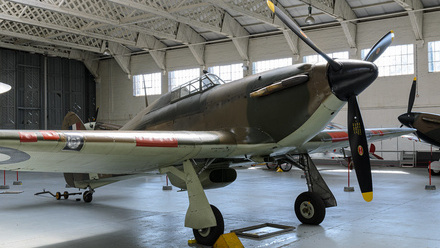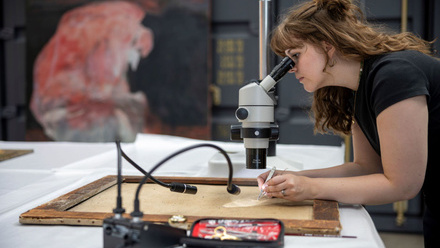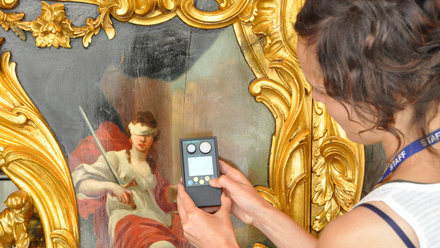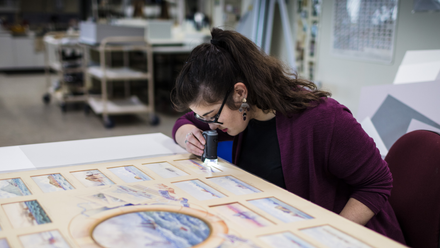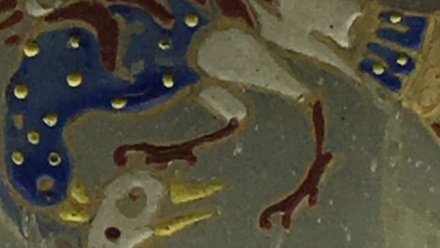So you want to be a conservator? 10 traits you need to succeed
Conservation is a relatively opaque profession. Those outside the field would be forgiven for thinking it involves fiddling with something for a very long time to sort-of make it look like what it did before.
Those inside the field understand the strong foundation of scientific knowledge, practical training and painstaking work that is necessary to build a career as a conservator.
As for those on the outside hoping to get in, starting a career in conservation can be both daunting and confusing. Some future conservators already have an interest in a specialist area; for others, this initial choice presents a bewildering array of possibilities. Many aren’t yet sure if they even have the necessary skills and qualities.
To help prepare you for a career in conservation, Icon asked 20 of our mentors and accredited conservators for their thoughts on the intrinsic qualities you need to succeed. Here’s what they said.
1. A genuine interest in conservation
Conservation requires an understanding and appreciation of not only the objects you work with, but also the significance of heritage conservation in its wider context.
Paintings conservator Katherine Ara tells us: "Skills can be learnt over time and knowledge readily transferred. Characteristics or qualities, however, are inherent to the individual and cannot really be taught." Of these qualities, she cites "a passion for the works of art/objects and an ability to look critically" as one of the most important in a conservator.
Dr Caroline Buttler, Head of Palaeontology at Amgueddfa Cymru – National Museum Wales, adds: "You must have an appreciation of heritage. To best conserve a specimen, a conservator needs to appreciate and understand its historical and scientific significance."
Christopher Weeks, conservator at Manx National Heritage, agrees: "The best conservators I have worked with share a keen interest in how things are made and what they are made from. Such an interest can take you on amazing journeys around the world and into history."
Craftsmanship is not a dirty word
2. Craftsmanship
A significant proportion of our experts cite craftsmanship as an important trait in a conservator.
Book and paper conservator Ann-Marie Miller says, "Excellent craft skills are an essential part of the conservator’s arsenal. It is our job to ensure the due level of respect to the makers of the historic objects that we work on, by approaching them with well-honed skills that are practiced, refined and continually improved."
Freelance conservator Allyson Rae also highlights the importance of hand skills: "Conservation is a very practical profession and, whatever ethical and theoretical concerns you need to keep in mind, the bottom line is undertaking practical treatments of objects. Employers need you to be capable and interested in preparing objects for exhibition and loan."
"The practical is no less important than the academic," adds Jonathan Ashley-Smith, Head of Conservation at the V&A from 1977 to 2002 and now a researcher and consultant. "Achieving competence with hand skills is only the beginning; there is always room for improvement. Craftsmanship is not a dirty word."
3. Awareness
An awareness of the objects being worked on and caution in your actions is also highly important warn our conservators.
Jonathan Ashley-Smith says, "It’s amazing how many people are not visually aware. Practise not just looking closely at an object but also being totally aware of everything surrounding the object and everything surrounding you. Conservation is about knowing the relationships between things, people and their contexts."
He adds: "One of the first things I was taught when I was working in the metalwork conservation workshop at the V&A was 'measure twice, cut once'. Make sure that you are absolutely certain that you understand what you are committing to before taking action."
John Wynn Griffiths, conservator at The National Trust, advises restraint: "Less is more. Every physical intervention to an object is a loss of its ability to reflect its history."
Oil paintings conservator Julia Dalzell adds: "Conservators must have respect for the object as we are only keepers for the next generation."
I feel I should be working as a UN diplomat rather than a conservator
4. Excellent communication
Communication, tact and diplomacy are intrinsic qualities in a conservator say our experts.
Louisa Burden, Head of Conservation & Collections Care at Science Museum Group, tells us: "A good deal of my time is spent working with other people, helping them understand why conservators work in the way they do and what we are trying to achieve for the collection or object. There are times I feel I should be working as a UN diplomat rather than a conservator as I try to negotiate pragmatic solutions to problems involving the collection!"
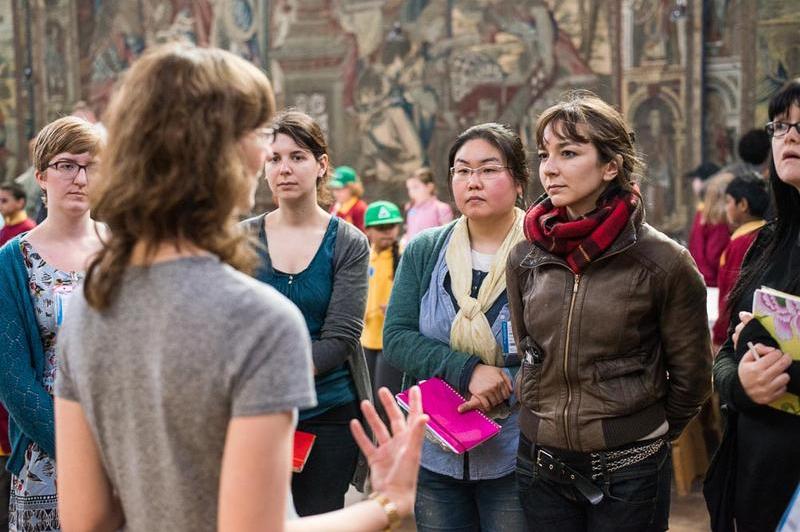
Jevon Thistlewood, Paintings Conservator at the Ashmolean Museum, agrees: "You need to be a clear communicator to both specialist and non-specialist audiences. Whether you’re spreading the word of conservation to new audiences, working in specialist groups, talking to stakeholders or responding to an emergency situation, you need to understand and be understood by others."
He adds: "In your work as a conservator, you may be called upon to resolve conflicting interests in the future care and display of an object. On occasion, you will also meet people immediately after or still recalling a dramatic or upsetting event in which an object has been damaged or discovered."
5. Adaptability
As digital developments begin to affect every field and profession, adaptability becomes all the more important, says Louise Robertson, Paper Conservator at the University of Glasgow: "For me, the job has changed massively over the past 20 years therefore I would recommend developing skills in being a flexible and reflective practitioner that meets the needs of the heritage material you work on. An increasing part of my role is to communicate clearly the measures I take through social media too. We have to be more creative too in how we get the conservation message across and in our outreach and learning."
Dharmachari Dayaka, Preservation Manager at the British Library, also cites technology as an important area of which to stay abreast: "We have drawn on new technology to help improve storage and transport. For example, we have found high density, low oxygen storage to be of great benefit to the collections."
Lara Artemis, Collection Care Manager at the Parliamentary Archives, urges conservators to be "open minded and flexible in their overall approach to conservation and preservation." She says: "You must have the ability to develop and balance both creative and critical thinking (theory) and doing (practice) to make informed decisions which overcome a range of conservation and preservation issues."
6. Tenacity
Tenacity and perseverance are intrinsic qualities in a conservator, says Amy Junker Heslip, Paper Conservator at Royal Pavilion & Museums: "This is a field where jobs are few and far between and funding is limited, so you cannot afford to be complacent. As a student conservator you need to have the determination to make the most of your course and the contacts provided in the conservation community. Contact professional conservators and ask to visit, ask their advice and ask for a placement! If there is no funding available for a course or training, find it! There are many funding options out there once you get going. You just need to be brave and go for it."
Emily O'Reilly, Principal Paper Conservator at National Museum Wales, adds: "To make it as a conservator, the one thing you need now more than ever is commitment to the profession; commitment to get out there and find opportunities, be it volunteer roles or work experience; commitment to move where the opportunities arise. Take the initiative and immerse yourself into your chosen specialism."
Join Icon and come to Icon Conference 2016 to meet professional conservators and build up your network of contacts.
7. Patience
Iwan Bryn James, Head of Conservation at the National Library of Wales, tells us: "Conservators need to carefully evaluate the work that’s needed. Don’t rush into a job and don’t take risks. Patience is a virtue."
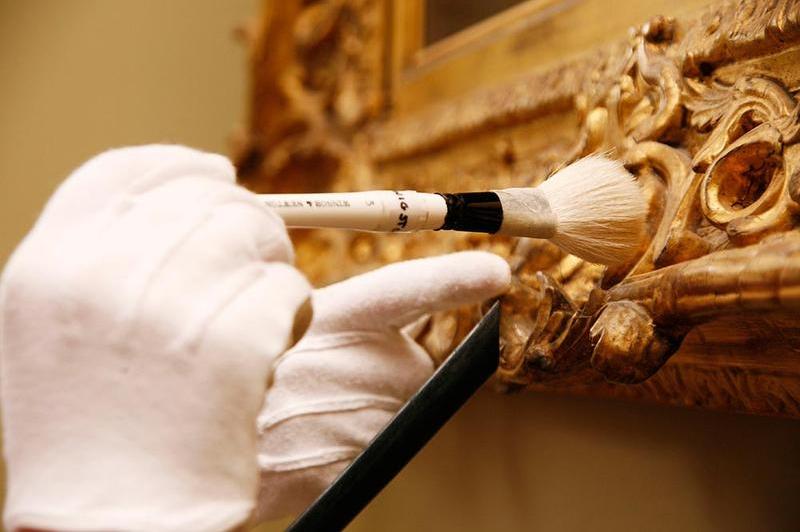
Paleontologist and Conservator Nigel Larkin reinforces this point: "Patience is one of the most important skills required of a conservator. Not only are many tasks very time-consuming and, frankly, sometimes extremely dull and no short-cuts can be taken, but some tasks will require such dexterity and perseverance that they can seem impossible to complete."
8. Business nous
Heritage conservation is an art, a science and in many cases also a business. Conservators cannot afford to ignore basic business skills, warn our experts.
Louisa Burden says: "All conservators need to understand how to cost up projects and work with budgets. Whether you are in the private or public sector, the same skills are needed. You also need to know and keep up with the political and financial environment of the organisation you work for. Doing this helps you decide if you want to work, or continue to work, within it but also know what financial restrictions are likely to be in the pipeline. It’s not what we get into conservation for but it is good professional career practice."
John Wynn Griffiths adds: "You must have the ability to be pragmatic: budgets are never big enough and we can never do all that is needed, so we have to negotiate and find a way to achieve what we can."
Senior Objects Conservator Helen Williams also cites negotiation skills as highly important: "Conservators need to be able to discuss what is appropriate for objects within the realms of project requirements. Flexibility is also important; the ability to adapt to changing deadlines or budgets which can often happen with funded projects."
9. An analytical mind
Valerie Blyth, Senior Preventive Conservator at the V&A, says: "For working as a preventive conservator, apart from a thorough grounding in the main agents of object deterioration and an environmental awareness, the conservator needs to have clear and critical thinking to carry out risk assessments. Conservators must be practical as well as creative to work out solutions in an ever changing museum environment where priorities and resources change frequently."
Sue Renault, Chief Conservator in History and Archaeology at National Museum Wales, adds: "Conservators need a good grounding in science to understand the materials they are working on and the treatments they are applying."
Textiles Conservator Janie Lightfoot elaborates: "Conservators should have a rudimentary awareness of organic chemistry to assist in the understanding of potential treatments and their differences along with being able to ascertain deterioration of fibres and to evaluate authenticity and any other previous treatment history."
We must have respect for the object as we are only keepers for the next generation
10. A willingness to document
Documentation is often an afterthought, not only in conservation but a wide variety of fields beyond. It can be time consuming, painstaking and often tedious but it is also one of the most important parts of undertaking work in conservation.
John Wynn Griffiths urges conservators to develop “a deep understanding of the critical importance of documenting what we do”. He explains: “So much work in the past was not recorded and it is an endless complication.”
How do you measure up? What traits or skills have we missed? Share your thoughts with us on Facebook or Twitter.


